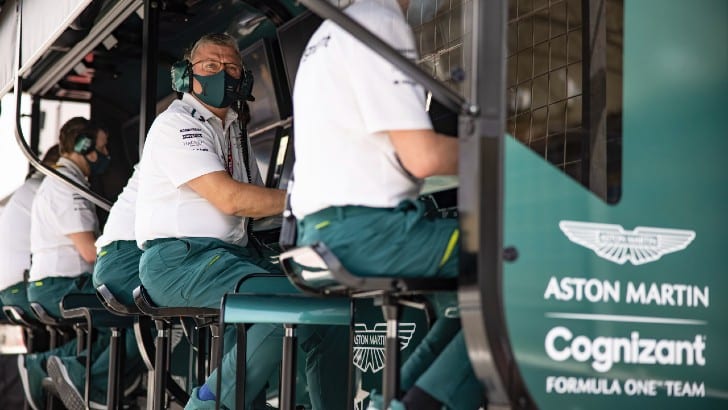
The Aston Martin Cognizant Formula 1 team uses IFS applications to increase operational efficiency and meet the new cost caps set by the Federation Internationale d’Automobilie (FIA). The team will use the IFS ERP solution to track costs, guide investment decisions, and development decisions. She can now also provide the FIA with evidence that she has not exceeded the cost ceiling of 145 million US dollars for 2021. The cap was lowered from $ 175 after the impact of the pandemic. The cap will be further reduced to $ 135 million by 2023.

This partnership can trace its origins back to 2019 when IFS announced a multi-year partnership with the SportPesa Racing Point F1 Team. Racing Point was renamed Racing Point Force India F1 Team in 2019 and renamed Aston Martin for the 2021 season, bringing back an iconic name for the sport.
Aston Martin began implementing IFS in 2019. Then IFS did its financial reporting and replaced a solution that did not meet its needs. In addition, the ERP was introduced to support the operations of the production team. At the time, Aston Martin F1 Chief Financial Officer Robert Yeowart commented, “The fit was right, it felt right, and then we’ve proven that this fit is right for this business.”
IFS is campaigning for the new regulations
Importantly, IFS enables the team to show the FIA both the amount spent so far and a forecast in real time. This ensures that the team is unlikely to break the cap. Yeowart commented, “The FIA can come and audit us anytime. You can check our accounts and check everything we spent where and when. The new reporting requirements are demanding.
“In addition to the technical and competition law compliance that we are used to, the committee looks for anomalies and trends in order to uncover any team that is working beyond the defined cost limits. We have to be ready to provide the evidence and audit trails to support any inspection. “
In the past, F1 teams have tried to improve their performance at low cost. Today, with a cap, innovation, though arguably constrained, is done with cost-effectiveness in mind. Will cost limits hamper innovation? Or will it help advance it in such a way that it helps the broader automotive and other industries?
Use IFS from the factory to the racetrack
Aston Marton F1 is slated to open its purpose-built factory in late 2022. It is being built on the old factory site, but construction was delayed due to Covid. IFS enables Aston Martin to closely track every component the team uses from the moment it is ordered, stored and used.
Yeowart added, “IFS has given us the perfect platform to build on. It enables us to really understand where we spend our money through detailed cost analysis that we couldn’t do before. We can track our inventory and ask questions like “What parts do we have available for us?” answer. What condition are they in? How many parts are there in the building and how much does each one cost? “
Aston Martin will use IFS to provide a pound for run time analysis. In this way it can be analyzed which components contribute most cost-effectively to the fastest lap times. What is important is that this can also help reduce costs in its supply chain. Suppliers must also pay attention to cost efficiency in the manufacture of these components. It should help foster innovation, but in a broader context. Aston Martin now has the ability to analyze the improvements of each development project in relation to the total cost.
In the new Formula 1 era, Yeowart believes IFS and its other partners can help him succeed. Yeowart added, “With a cost cap, in addition to our IFS system, we have the perfect opportunity to really focus on efficiency, optimization and ultimately our purpose: helping 1,000+ people get the best possible performance within regulated constraints and expenses for our F1 competition cars. “
Inventory management critical
Aston Martin will also use IFS Supply Chain Management, which includes its inventory management solution, to keep track of where and when parts are being used. The latter is particularly important. Parts that are used in subsequent years must be assigned to the correct accounting year by the FIA. Barcoded components allow Aston Martin to keep track of when they were purchased and, more importantly, used.
Yeowart added, “We know exactly where our inventory is, when we first used a part, how many miles it has run, how long it will last and when to think about a replacement part. Towards the end of the season, this is all absolutely critical, as we may have had an accident and are about to reach the limit. “
IFS has been using IFS for several years and continues to help Aston Martin. Yeowart added, “IFS can help my team meet cost cap regulations by improving our planning, data, and analysis. It helps us to understand where we have spent our money so far, what we can still spend up to the limit and how we want to spend it.
“This allows us to analyze where we can improve the car’s performance and whether this is the best use of our limited resources. And it ensures that when reporting to the FIA, we are 100 percent sure that the information we provide is correct and exactly meets the requirements. “
Enterprise Times: What does that mean?
Innovations that were first introduced in Formula 1 are now being used more often in road vehicles. These include active suspension, traction control, carbon fiber construction, advanced aerodynamics and semi-automatic paddle gearboxes. In addition, research on safety and tires has a significant impact on the automotive industry.
IFS is no stranger to innovation either, because its IFS Labs are continuously working on the latest technological developments. Combined with an F1 team, it will be interesting to see what comes out of that. Not only for the benefit of Aston Martin, but also for the wider IFS community.
While this is not a new relationship, it does enter a new chapter. It shows how IFS ‘flexibility and cost control features can help what is suddenly a heavily regulated industry from a financial perspective. With IFS, Aston Martin has a partner who can help him master and master the new challenges.

Oliver Pilgerstorfer, IFS Chief Marketing Officer, commented, “The effective collection and processing of data is critical for high performing companies like Aston Martin F1. Formula 1 racing is all about precision, which is relevant across the entire value chain, where hundreds, if not thousands, of individual processes have to be perfectly coordinated in order to be successful on race day – that is the moment of service, if everything comes together. IFS prides itself on empowering many of the world’s most respected brands to excel, often in highly regulated industries where compliance, traceability and quality assurance are really important. “
The post Aston Martin Cognizant Formula One Team adheres to IFS – first appeared on monter-une-startup.





